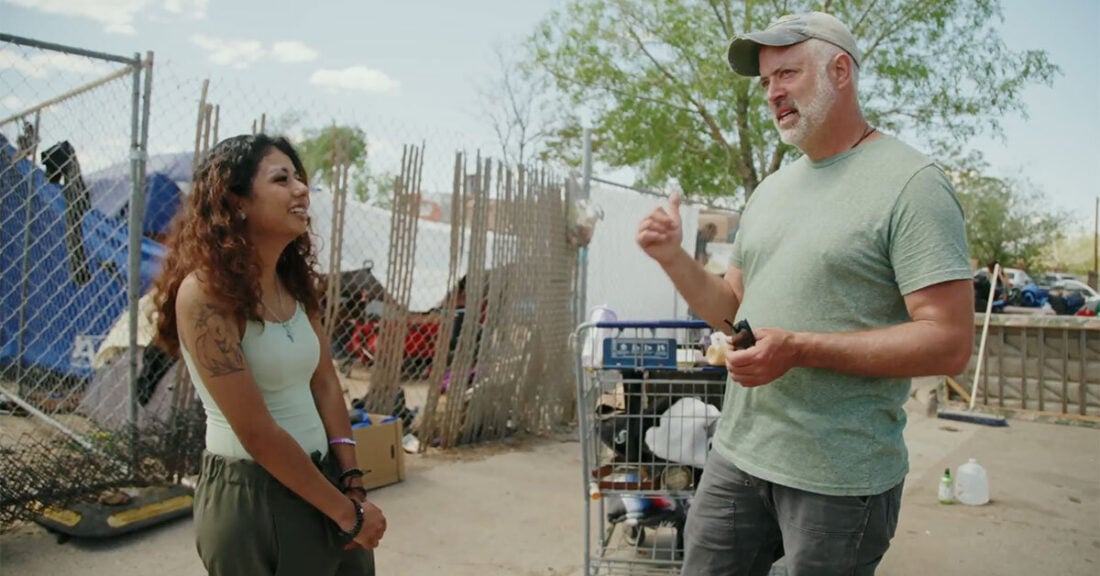How a Work-Based Learning Model Is Helping Students Stay in School

Lexy Aragon during her capstone internship with East Central Ministries (photo credit: Ernie Zahn from Tse’Nato’)
Individualized youth internships are keeping students at Del Norte High School in Albuquerque, New Mexico, on track to achieve academic and career goals. By interning at organizations that address homelessness, these students are building academic and occupational skills as they contribute to their communities.
Dubbed the Del Norte Work-Based Learning (WBL) Ecosystem, this collaboration of educators, nonprofits, employers and young people receives funding from the Annie E. Casey Foundation. The program is part of the Foundation’s Thrive by 25® commitment to invest in the well-being and success of teens and young adults, guided by local partners in Albuquerque, Atlanta and Baltimore. Casey’s Thrive by 25 partner in Albuquerque is Future Focused Education (FFE), which works to transform education to better respond to students’ and help schools and districts in strengthening or implementing work-based learning programs.
Work-based learning combines work experience with classroom learning so that participants can gain affordable, industry-recognized credentials and employment skills.
“The program’s initial success with housing insecurity shows its potential to meet other basic needs that contribute to youth well-being,” said Charles Rutheiser, a senior associate at the Foundation. Securing housing — along with other basic needs such as food, safety, physical and mental health, transportation and child care — allows young people to better focus on long-term goals and become self-sufficient.
Pre-Internship Curriculum: Building a Foundation
“Del Norte High School is charting new ground as one of the first large, comprehensive public schools in the region to braid New Mexico’s graduation pathways with work-based learning and community service-oriented capstones,” said Kim Lanoy-Sandoval, FFE’s executive director. In New Mexico, capstone projects showcase skills students have acquired.
The school serves a culturally rich, dynamic community where families are eager to support their children’s success. In 2023, FFE convened students, educators and more than 25 public and private partners to co-design hands-on learning experiences that address several objectives:
- Keep students engaged in school.
- Build a local workforce equipped to address urgent community needs.
- Guide students to identify a specific area of need for their work-based learning.
Moneka Stevens, FFE’s director of reciprocal partnerships, collaborates with teachers to design this programming. “They know their students best,” said Stevens. “My role is to support teachers in identifying key learning outcomes and to ask students what they want to learn.”
With as many as 15% of Del Norte students experiencing homelessness, the students chose to focus their efforts on housing insecurity.
The WBL Ecosystem offers a developmentally appropriate sequence of learning and career preparation. From ninth through 11th grade, students follow a pre-internship curriculum that teaches workplace skills and expectations. As part of the curriculum, 11th grade students study various perspectives on youth homelessness. They develop questions to lead peer discussions, building transferable skills in critical thinking that apply to multiple career paths.
FFE reports that students who completed the pre-internship curriculum gained skills in time management, problem solving and reflection. The focus on social issues also helped boost self-awareness and empathy.
Capstone Projects With Real-World Impact
Through its X3 Internship program, FFE connects 11th and 12th graders with nonprofits addressing youth homelessness. These internships offer a stipend of $13 per hour.
In partnership with ABQ Mutual Aid, students helped distribute care packages and explored careers in housing advocacy and nonprofit leadership. The Capstone teacher and nonprofit staff co-designed group experiences that deepened student understanding.
It changed my life.
— Capstone student
Students described their Capstone experiences as powerful and inspiring. They valued the opportunity to express their views, work independently and with adults and earn real-world credentials such as the teen Mental Health First Aid certificate. “It changed my life,” said one student.
Because many Capstone students have experienced homelessness themselves, teachers and staff collaborate with Albuquerque Public Schools’ McKinney-Vento Program to help these students succeed academically. The program also joined the Capstone launch and will support internships in the coming year.
In May 2025, students proposed a youth-led resource center to school administrators. This center would serve as a peer-to-peer WBL hub offering nutrition education, clothing, mental health programming and other services. The County’s ABC Community Schools Partnership supports the hub’s development.
A Promising Model for the Future
The WBL Ecosystem is showing promising results. All 115 participants have either graduated or remain in school. Every 12th grade participant has graduated and enrolled in postsecondary education. FFE plans to expand the WBL Ecosystem throughout Del Norte High School, integrating it into more existing courses and programs. This will ensure that more students benefit and that work-based learning becomes a standard part of the school’s education strategy.
“This approach creates a relevant and meaningful academic experience where young people not only master rigorous content but also step into leadership roles that strengthen their communities,” Lanoy-Sandoval said. “Del Norte’s WBL Ecosystem has the potential to serve as a model and proof of concept for schools across the district and the state.”






